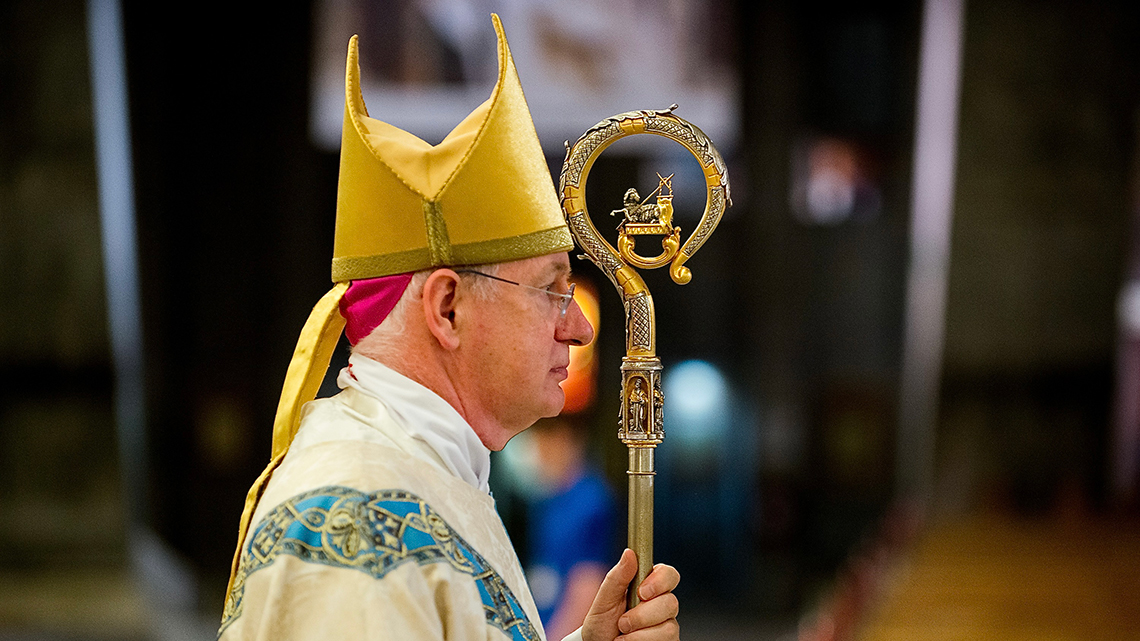
Bishop Richard Moth of Arundel and Brighton, and Chair for the Department of Social Justice, has encouraged Catholics to write to their MPs to voice their opposition to the Terminally Ill Adults (End of Life) Bill after saying “the outcome of the debate is by no means certain”.
“I ask you to write to your MP, urging them strongly to vote against this proposed legislation,” he said. “The outcome of the debate is by no means certain, and every letter makes a difference and proclaims the dignity of life and the need to protect the vulnerable.”
“The proposed legislation will bring anxiety to so many,” he added. “Rather than offer ‘choice’ – as has been suggested – it will, instead, potentially impose significant pressure on people who are at a very vulnerable time in their lives, especially the elderly and those living with disabilities.”
Bishop Moth’s pastoral letter will be read out at all the parishes in his diocese this weekend, 16 and 17 November, ahead of the Second Reading of the Bill, tabled by Kim Leadbeater MP, on Friday 29 November.
Dear brothers and sisters in Christ,
With the publication of the “Assisted Dying Bill” to be debated on the 29 November, I ask each and every one of you to pray earnestly that the dignity of human life is respected from the moment of conception to natural death – and to write to your MPs, asking that they vote against the Bill.
The great majority of us will have experienced the death of a loved one, and we know the importance of compassion for those who are facing the loss of someone they know and love. The last journey that we take is so often accompanied by illness, which can sometimes be long and, perhaps, marked by suffering.
The compassion that we are called to show – that “suffering with” that is a most precious gift to others, calls us, and all in our society, to show understanding and respect to all who are approaching their last days, to their loved ones, and to the healthcare professionals who give so much of themselves at these times.
The proposed legislation will bring anxiety to so many and, rather than offer “choice” – as has been suggested – will, instead, potentially impose significant pressure on people who are at a very vulnerable time in their lives, especially the elderly and those living with disabilities.
While the proposed legislation may offer assurances of safeguards, the evidence is clear that, in those countries such as Canada and Belgium (to take just two examples) where legislation approving “assisted dying” is in place, it takes little time before the criteria for “assisted dying” expand, often including those living with mental illness and others who do not have a terminal diagnosis.
The relationship between patient and doctors and other healthcare professionals is precious to patients, and their loved ones. The pressure on doctors to recommend or enable such procedures will result in significant damage to this important relationship and, potentially, bring many who have devoted their lives to healthcare to feel unable to continue their vital work.
So, I ask you to write to your MP, urging them most strongly to vote against this proposed legislation. The outcome of the debate is by no means certain, and every letter makes a difference and proclaims the dignity of life and the need to protect the vulnerable.
If you are concerned about writing a letter yourself, postcards will be coming to all parishes, which will make this task easier.
If you are writing a letter, may I ask you to call for effective support and funding for our hospices and for end-of-life care. The healthcare professionals who work in our hospices, hospitals, and across the community, deserve our particular support and prayers at this time.
Pray for our MPs, that they may recognise that their first priority must be the protection and care for the most vulnerable in our society, and that supporting this legislation would result in a dangerous abrogation of this responsibility.
Pray, too, for those who are seriously ill, for those who are dying, for their loved ones and all who care for them, either at home, or in our hospitals and hospices.
On the morning of 29th November, let us all come together in prayer – ideally for a Holy Hour of prayer before the Blessed Sacrament and redouble our prayer through fasting, that the dignity of life may be respected.
May the Lord Jesus, Whose love conquers all and in Whom we find life to the full, prompt our every action as we seek to defend, and uphold, the lives of our most vulnerable brothers and sisters.
With every Blessing,
Bishop Richard Moth
Bishop of Arundel and Brighton
Chair for the Department of Social Justice
Notifications